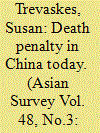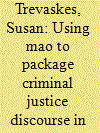| Srl | Item |
| 1 |
ID:
082795


|
|
|
|
|
| Publication |
2008.
|
| Summary/Abstract |
This paper examines a recent debate at the highest level of China's politicolegal leadership on the application of the death penalty. The debate centers around the interpretation of a new criminal justice policy called "balancing leniency and severity" and around limiting the death penalty to all but the most egregious criminals
|
|
|
|
|
|
|
|
|
|
|
|
|
|
|
|
| 2 |
ID:
181943


|
|
|
|
|
| Summary/Abstract |
Building a national system of social governance (guojia zhili tixi), which is the long-running governance dream of Xi Jinping, has triggered the creation of China’s ‘smart state’ using the tools of new information technologies to advance governance capacity (zhili nengli). These systems were already deployed nationally when the COVID-19 pandemic hit China, but were connected at a lesser capacity, targeting specific domains of security, industry or government administration. In response to the crisis, multiple technologies have been merged, exceeding the scope of their originally intended functions. This is known as function creep, when surveillant technologies remain functional past achievement of their intended purpose, or surveillant assemblages, where multiple surveillant technologies are combined. As more countries turn to digitalisation to increase public security and intensify social and market governance, the expansion of surveillant functions in China and their now-palpable effects on people’s lives raises new and pressing questions for scholars and decision-makers alike.
|
|
|
|
|
|
|
|
|
|
|
|
|
|
|
|
| 3 |
ID:
144373


|
|
|
|
|
| Summary/Abstract |
This article examines how financial compensation has been drawn into death sentencing practice and debate in China. The Supreme People’s Court is nowadays encouraging judges to mediate between defendants and the families of homicide victims to secure a financial agreement between the two parties that will allow courts to sentence defendants to a two-year “suspended” death sentence which is commuted to a life sentence after the probation period. The SPC has promoted a series of “standard cases” that exemplify this practice. The controversial practice, dubbed “cash for clemency”, complicates the death penalty debate: critics say that it undermines the law and encourages “bargaining” for a life on the part of those who can afford to do so. Others, however, are sympathetic to any practice that can reduce execution rates. This controversy is part of a larger debate on state killing in the world’s largest killing state.
|
|
|
|
|
|
|
|
|
|
|
|
|
|
|
|
| 4 |
ID:
121253


|
|
|
|
|
| Publication |
2013.
|
| Summary/Abstract |
This paper considers the process of constructing the official
discourse of weiwen (??, stability preservation) in the policing arena in
the first decade of the 21st century. It focuses on the pivotal period after
2003 when policing priorities were shifted from "striking hard" at serious
crime to pursuing weiwen to contain burgeoning protests and civil dissent,
as a move to maintain stability in the early to mid years of the Hu Jintao-
Wen Jiabao harmonious society era. We observe how Mao has been
central in this process. Stability preservation operations have been rationalised through Maoist ideology using some staples of Maoist discourse, particularly "social contradictions", and policing authorities have
adopted key methodological aspects of Maoist campaign-style policing to
embed this new weiwen focus in the everyday agendas of policing, while
ever more "mass incidents" disrupt the maintenance of stability in China.
|
|
|
|
|
|
|
|
|
|
|
|
|
|
|
|
| 5 |
ID:
146510


|
|
|
|
|
| Summary/Abstract |
“Strike hard” anti-crime campaigns, “harmonious justice” and “stability maintenance” are the three key politically inspired agendas of crime control and punishment in 21st-century China. This paper is a study of how discourse has helped to package these agendas and to mobilize politico-legal functionaries into action. It examines discourse in the first weeks of the 2014 “people's war on terror” and the agendas of “harmonious justice” and “stability maintenance” in the Hu Jintao era. It finds that each has been rationalized and shaped by an understanding of the utility of punishment based on Mao's utilitarian dialectics. The political virtuosity of Mao's dialectics is that it can be adapted to suit any political situation. In understanding how Mao connects with criminal justice in China today, this paper identifies what is the “political” in “politico-legal” discourse in the fight against crime in the 21st century.
|
|
|
|
|
|
|
|
|
|
|
|
|
|
|
|